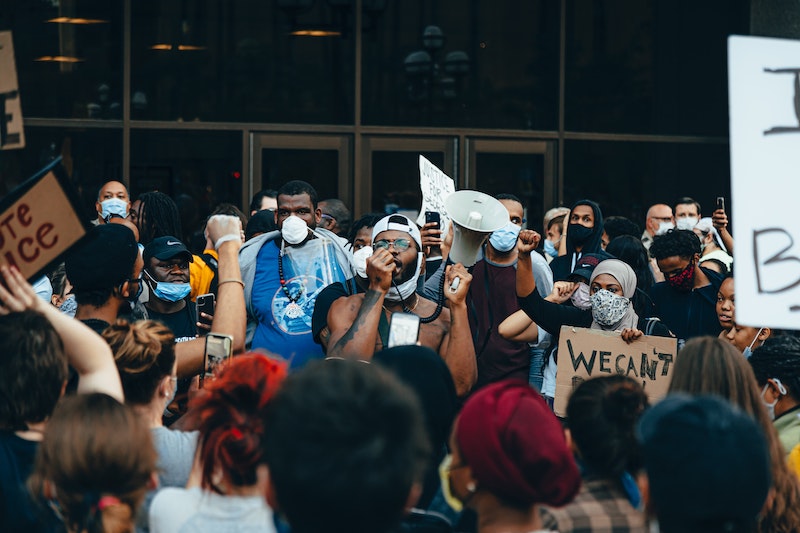ImpactAlpha, June 1 – Agents of justice are agents of impact.
The anger in the streets this weekend is an expression of the manifest injustice of police brutality. And the manifest injustice of the nation’s response to the coronavirus pandemic. And the unacceptably slow progress toward, and outright hostility to, an economic and social system of inclusion, equality and regeneration, not exclusion, extraction and injustice.
For months, ImpactAlpha has been watching, and waiting, for a broad social mobilization for change, in the understanding that real change means shifting power, that power is surrendered only reluctantly and that overcoming that reluctance requires an historic mobilization of popular will.
And so, well before the pandemic, we celebrated youthful climate protestors as the real pro-business lobby, insofar as aggressive action against the systemic risk of climate change is inarguably better not only for workers and communities and natural ecosystems, but for investors and companies as well.
We applauded last year’s massive street protests from Santiago to Hong Kong to Jakarta, as mostly middle-class crowds revolted against incompetent governance, rising prices and rampant inequality. The social inequality protesters were pro-business as well, forcing a re-evaluation of the systemic risk of income inequality. Forging a new social contract – making more poor people richer – is the only basis for sustainable economic prosperity.
In the early days of the lockdown, when we were “all in this together,” there was a fantasy that neighborhood mutual aid and the shared responsibility of fighting the virus would demonstrate the power of people working together for social progress. Social distancing and masks, testing and contact tracing would beget new forms of community organizing as we flattened the curve together. Taking on the coronavirus together, we dreamed, meant we could together take on climate change and perhaps even capitalism.
That ran aground as political factions sought advantage in division rather than cohesion. While trillions were unleashed to rescue markets and corporations, workers and communities were left to largely fend for themselves in the face of both the virus and the economic meltdown.
Broken system
The virus, and the response, functioned as an X-ray to reveal underlying structures of the system so badly in need of change. COVID itself disproportionately claimed Black bodies. Essential workers were treated as expendable workers. Poorly conceived and executed response packages largely failed to reach Black-owned businesses. Early reopenings put Black and Brown workers in low-wage, high-exposure jobs at greater risk.
Shelter-in-place orders had largely shut down last year’s mass protests. The only people in the streets, and thus on cable news, were the small bands protesting governors who insisted on stepwise measures to reopen the economy.
But the lockdown didn’t lock down the agonizingly recurrent incidence of violence and injustice against Black Americans. Then came the deaths of Ahmaud Arbery in Georgia, Breonna Taylor in Louisville, and last week, George Floyd in Minneapolis.
The protests in 75 cities and the rage in millions of families and households this weekend similarly provide an invaluable service, exposing systemic risks and forcing a disruption in order to deal with them. Police brutality is a systemic risk. Racial injustice is a systemic risk. Racial wealth inequality is a systemic risk.
Agents of Justice
Leaders are pointing ways forward. For all the images of violence and confrontation, stories of solidarity are also emerging. Black protesters protected vulnerable officers. White protesters shielded Black protesters. Police chiefs in Camden, Flint, Atlanta, Santa Cruz, Norfolk, Houston and other cities joined marches, and officers across the country took a knee in solidarity. Long Twitter threads document moments of dancing, singing and peaceful protest cable television largely missed.
In Atlanta, activist and rapper Killer Mike laid out plans to “plot, plan, strategize, organize and mobilize” to fight systemic racism. “If you want change in America, go and register to vote,” urged Mayor Keisha Lance Bottoms. “Do it in November. That is the change we need in this country.”
In Minnesota, Tamika Mallory, a co-chair of the national Women’s March, demanded elected officials and local leaders hold the police accountable. “Charge the cops,” she said.
In this moral moment, “We must choose to be agents of justice,” said U.S. Sen. Cory Booker of New Jersey. Racial inequity pervades not just the criminal justice system, he said, but health care and the environment, as well. “Peace is not just the absence of violence. It’s the presence of justice,” Booker said. “The question, if racism exists, is not, ‘Are you or are you not a racist?’ It’s ‘Are you or are you not doing something about racism?’”
Journalist Sherrell Dorsey is lifting up statements of solidarity from tech companies in order to hold them accountable for their actions. Lambda School’s DeWayne Roy is calling on investors to overcome bias, invest in Black founders and hire Black employees. Opportunity Hub’s Rodney Sampson proposed top venture capital firms fund inclusive tech ecosystems in cities with majority Black populations.
The wave of protests overlaps the season of high school and college graduations, already radically reshaped by the pandemic. “Don’t just activate yourself online,” former president Barack Obama told graduates of historically black colleges and universities last month. “Change requires strategy, action, organizing, marching, and voting in the real world like never before.”
If racism is a systemic risk, overcoming its legacy and investing in justice and equality are systemic opportunities. The recovery from the COVID crisis presents many such opportunities, and the trillions flowing in relief have upended the excuse that resources are not available to tackle such challenges. In the days ahead, we’ll explore many such strategies.
We’ll especially be on the lookout for leadership to “plot, plan, strategize, organize and mobilize” the broad and historic social mobilization that is so urgently needed to fight racism, restructure systems – and shift power.











